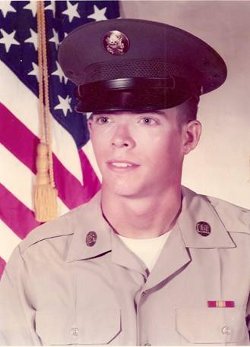
Sergeant Dave Getka
In July 1972 at the age of eighteen Dave was college bound to the University of Wisconsin in Madison,WI but, decided to serve his country and volunteered to enlist in the U.S Army during the Vietnam conflict. He took basic training at Fort Leonard Wood, MO and advanced training at Fort Devens, MA with the Army Security Agency and later attended training at the Army Intelligence School in Fort Huachuca,AZ.
The Security Agency’s motto was "Vigilant Always" and was the successor to a number of Army signal intelligence operations dating back to World War I. As well as intelligence gathering, it also had responsibility for the security of Army communications and for electronic countermeasures operations. The ASA was composed primarily of soldiers with the very highest scores on Army intelligence tests that could qualify for a “Top Secret Clearance” due to the sensitivity and importance of the intelligence information that was collected, analyzed. processed and distributed to the proper Command channels.
After initial training at Fort Devens he attended Ground Surveillance Radar school at the Army Intelligence School at Fort Huachuca, AZ. Upon completion of this training he was later assigned to the Combat Support Company of the 6/32nd Armor (“Thunderbolts”)
Battalion (Motto:“Victory or Death”) of the 4th Infantry Mechanized Division based at Fort Carson, CO.
The 4th Infantry Division returned from Vietnam in December of 1970 and settled at Fort Carson, Colorado, where it reorganized as a mechanized unit and remained for 25 years. It was during the Division's time at Fort Carson that its nickname transitioned from the (“Ivy”) Division to the "Ironhorse" Division. The nickname, "Ironhorse," remains today in recognition of the Division's readiness for contingency deployment worldwide.
At the beginning of the 1973 Arab-Israeli “October War” the 4th Infantry Division was placed on Red Alert status for the Middle-East conflict and he prepared for deployment.
After seven days the Israelis and Arab states reached a resolution and the 4th Division was placed on a “stand down” status.
While stationed at Fort Carson, CO he assumed additional duties as the company Chemical, Biological, and Radiological NCO. He was selected to be on the Battalion Color Guard team which would participate in ceremonial events and funeral services for both active service and military veterans. He was selected to be a participant in the Colorado Springs Air Force Academy’s P.O.W. resistance training program.
Today the 4th Infantry Division is the Army's First Digitized Division and is the most lethal, modern, and deployable heavy U.S. Army division in the world and was responsible for capturing Saddam Hussein toward the end of Operation Iraqi Freedom.
Upon being honorably discharged after three years of service Dave was awarded the Thunderbolt’s Certificate of Outstanding Achievement by his commanding officer. He served another three years in the Army In-active Reserve while attending college in Wisconsin. While in college he enlisted as a Sergeant in the Wisconsin Army National Guard and served three years in the 2nd Battalion 128th Infantry Support Company in the Radar Ground Surveillance unit. Upon the end of his three year enlistment term he received an Honorable Discharge.
Upon graduation from college and gaining employment in the private sector in St. Louis, MO Dave enlisted as a Staff Sergeant in the 157th Tactical Control Flight Group of the Missouri Air National Guard as a Tactical Air Control and Warning Systems Operator at Jefferson Barracks, MO. A Tactical Air Control Party, commonly abbreviated TACP (pronounced Tack-P), is usually a team of two or more United States Air Force Tactical Air Command and Control Specialists aligned with a United States Army combat maneuver unit, either conventional or special operational, to advise ground commanders on the best use of air power, establish and maintain command and control communications, and provide precision terminal attack guidance of U.S. and coalition close air support and other air-to-ground aircraft.
During his two year enlistment he participated in a two-week Nato/U.S. Military Strategic War Game scenario involving all four U.S. Armed Forces groups which was code named “Blue Flag”. He participated as a Tactical Air Controller at Eglin Air Force Base near the City of Pensacola, FL. Dave was eventually transferred with his civilian employer to San Diego, CA and was allowed to resign with an Honorable Discharge.
Dave’s years of Active, Reserve, and National Guard military service never placed him in an active combat situation but his family is proud of his patriotism, volunteerism, and willingness to serve his country and place himself in harm’s way should his country have called upon him.